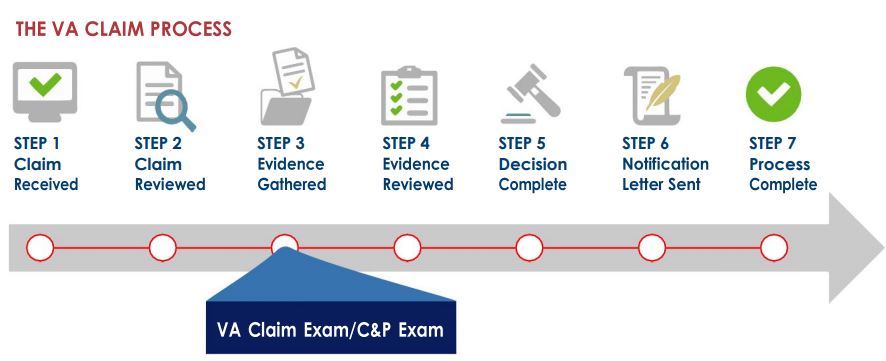Many Fewer In-House Assessments Expected to Occur in Future

Disabilities determined by VA to be related to your military service may lead to monthly non-taxable compensation,
enrollment in the VA health care system, up to a 10-point hiring preference for federal employment and other
important benefits.
These include Disability Compensation, Pension, Health Care, Caregiver Program, Career Services, Educational
Assistance, Home Loan Guaranty, Insurance, Funeral, Burial and Dependents and Survivors’ benefits.
Please reach out to a VA-accredited representative, such as a Veterans Service Organization (VSO) representative, for
additional information. VSOs do not charge fees for their services. Information about VA-accredited representatives
can be found here; a state-by-state search for an accredited representative can be found here. Source: Veterans Benefits Administration
WASHINGTON, DC — Congress first granted VA the authority to contract veterans’ medical disability examinations (MDEs) out to non-VA medical staff in 1996. The goal of that original pilot program was to see whether doing so would speed up the exam process and get veterans their benefits sooner.
Today, contractors account for more than 85% of MDEs. While the initial goal of the program was to speed the benefits process, a primary reason given by VA officials now for contracting out exams is that it frees up VA medical staff to provide care for veterans.
In recent testimony before Congress, however, VA leaders admitted they have no evidence that relying so heavily on contractors is achieving that goal. And, while those leaders said that VHA employees would still be responsible for some portion of exams, many hospital administrators have been leaving examiner positions unfilled, assuming that soon all MDEs would be contracted out.
Meanwhile, VA overseers have found that, due to a lack of monitoring by VBA’s Medical Disability Examination Office (MDEO), vendors were requiring thousands of veterans to drive long distances to exams, which goes against the restrictions in their contract with VA.
In 2017, VHA examiners completed more than 700,000 exams compared to 600,000 completed by contracted examiners. In 2020, VHA completed fewer than 335,000 compared to contractors’ 1.1 million. At its current rate of production, VBA expects to complete 2.4 million exams in FY 2023—several hundred thousand due to PACT Act-related claims alone. Contractors will be responsible for the vast majority of those, but at least 200,000 will fall on VHA examiners.
In July 2022, VHA leaders notified facility directors that, due to a PACT Act surge, VHA examiners could be responsible for as many as 500,000 exams in 2025. A Government Accountability Office (GAO) report in June 2023 found that this message did not consistently make its way to the officials at VA facilities responsible for recruiting and retaining examiners, however. Many were still unsure whether they would need to maintain examiner capacity or if exams would shift entirely to contractors.
While VHA had issued guidance as early as January 2021 to facilities to halt any effort to eliminate examiner positions, some facilities thought this still gave them leeway to move away from in-facility exams. Others thought it allowed them to leave examiner positions vacant once employees retired.
Workload Distribution
According to VA leaders, they are working to address this miscommunication.
“We’re meeting with VHA on a weekly basis to discuss the state of the workload,” MDEO Director Jeff London told legislators at a House Disability Assistance Subcommittee hearing. “We’re working to have a formal allocation plan, so we have a common understanding of what the workload distribution is going forward.”
At the same hearing, legislators pressed VA officials on reports from veterans that they were being asked to drive long distances to receive their exams. These claims were backed up by a VA Office of the Inspector General (OIG) report that found an estimated 65,000 veterans in 2021 had been asked by vendors to drive over the distance maximum for their disability exam.
Vendor contracts require that exams be scheduled no farther than 50 miles for nonspecialist exams and 100 miles for specialist exams. Those limits can be exceeded, but only with the veteran’s consent and MDEO’s approval.
OIG found that, on average, those 65,000 veterans traveled about 93 miles round trip beyond the contractual limits. They also found that only 18% of the exam records included any documentation of express veteran consent to travel that far.
According to Steve Bracci, director of OIG’s Claims and Medical Exams Benefits Inspection Division, MDEO was unaware of the extent of the problem until the OIG report and immediately began to take steps to correct it.
The larger questions committee members had about the success of the contract examiner program went unanswered.
When asked whether OIG had any idea of whether contract examines are equal in quality to VHA examiners, Bracci informed legislators that “OIG has not done that assessment.”
And when asked whether using contract examiners has freed up VHA staff to provide care to its enrolled population, VA officials could not answer.
“I have no knowledge that any analysis has been done to answer that question,” London said.
